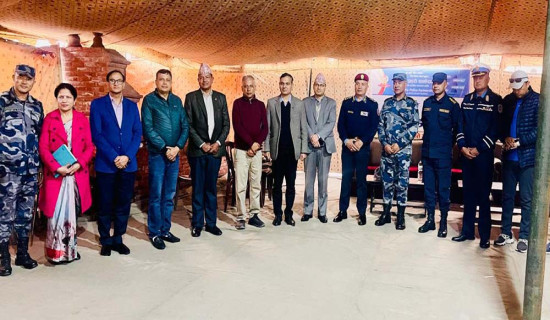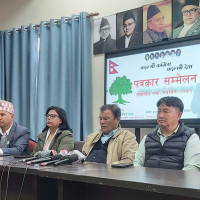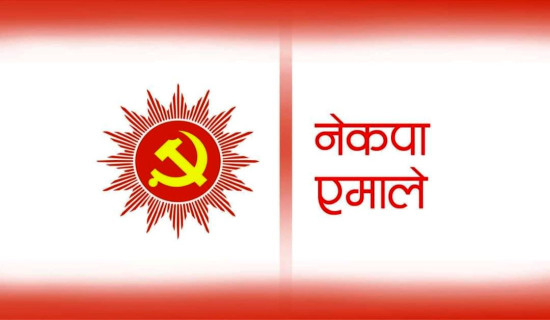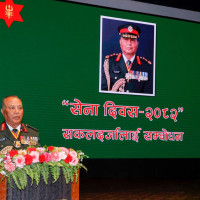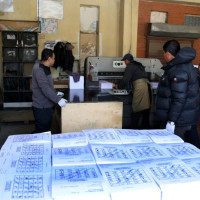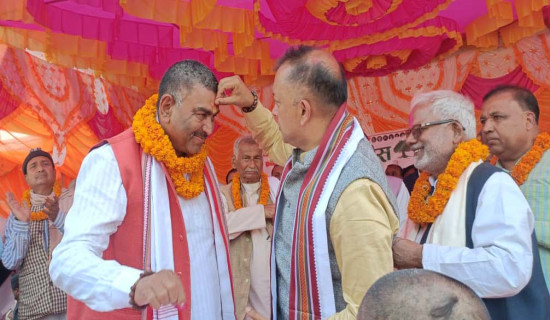- Sunday, 15 February 2026
By-election results: Wake-up call for big political parties
By Pallav Bhusal,Kathmandu, Apr. 30: No constituency is a stronghold of a particular party and no candidate of the traditional big parties is safe in their home constituency. This is the clear message of the by-election of April 23, especially in Tanahun-1.
While Nepali Congress candidate Govinda Bhattarai was a local from the same constituency and has been in direct contact with locals through development activities. The constituency was one of the safe constituencies for the Nepali Congress candidate as all elections from 1991 to 2013 were won by NC’s candidate. Only in 2017 elections, common candidate of the CPN-UML and the Maoist Centre had defeated NC’s Ram Chandra Paudel in this constituency. In November 2022 election, Paudel was elected with a margin of over 5,000 votes. But Bhattarai, a common candidate of the ruling parties, lost the election to Dr. Swarnim Wagle of the Rastriya Swatantra Party in the by-election. Although a new face, Wagle hailing from Gorkha, defeated Bhattarai with a big margin of over 14,797 votes. Interestingly, Wagle had joined RSP only on March 31, deserting the NC. Wagle garnered 34,919 votes and Bhattarai 20,122 votes.
Likewise, Rabi Lamichhane, chairman of the newly formed RSP, won from Chitwan-2 with a record margin—he defeated NC candidate Jit Narayan Shrestha by 42,962 votes. While Lamichhane got 54,176 votes, NC’s Shrestha got a meagre 11,214 votes.
But the by-election in Bara-2 gave expected results; Upendra Yadav, chairman of the Janata Samajwadi Party-Nepal and the common candidate of the ruling alliance, won there.
However, the Chaitwan and Tanahun by-election showed a clear political polaraisation. The voters expressed their dissatisfaction toward the traditional political parties and poured their support to the newly established RSP. UML fared even worse than NC both in Chitwan and Tanahun. Moreover, in Tanahun, the UML candidate lost over 11,000 votes in five months because the UML candidate got only 8,488 votes this by-election while its candidate had got 19,981 votes in November 2022.
Experts and political analysts blame the non-performance of the traditional parties for their rout in the by-polls.
“Traditional parties played a huge role in bringing about political and social changes through revolutions. However, they failed to deliver as per people’s expectations. Therefore, voters have shifted their votes towards the new political forces with high expectations,” said Muma Ram Khanal, a political analyst.
Our nation has constantly been facing political instability, leaders often resort to corruption and other unlawful activities, which have resulted in mass frustration, and the frustrated voters have punished the old parties in elections. Mostly, alterations in a society are driven to improve bad conditions, but in ours, they result only in instability.
It is noted that Nepali citizens living abroad have also influenced the recent poll results in Nepal. The victory of Balendra Shah as the mayor of Kath
mandu Metropolitan City showed that people living abroad and the social
media served as a means to influence the voting patterns, mostly of senior citizens and the first-time voters in the urban areas.
“There is a huge paradigm shift in the society towards new political parties. The access to information of vast majority people has contributed to changing the mind-set of the citizens and they get attracted to new political parties and figures. Similarly, voices of people living abroad and young people commanding the public tend to vote for fresh candidates which often culminate in this kind of results,” said Khim Lal Devkota, Central Committee member of the Communist Party of Nepal (Maoist Centre).
“The result also showed that there is a reactionary political system where utmost criticism of opposition parties helped the new candidates win the election. However, old parties should fulfil the gap between expectation and delivery as well as use modern technology to win the trust of the people back,” he added.
In Nepal, there has always been a shift in political power ever since the end of the Rana regime. After the end of Rana regime in 1951, Nepal adopted a multiparty parliamentary democracy with Bishweshwar Prasad Koirala becoming the first publicly elected Prime Minister of Nepal in 1959. But King Mahendra unseated him through a political coup in 1960 and ended the multi-party system.
Nepal went through another revolution in 1989 which reinstated the multiparty system with constitutional monarchy, but when King Gyanedra took over in 2005, the people launched another peaceful revolution which killed two birds with one stone -- ending both the decade-long Maoist insurgency as well as the century-old monarchical rule in 2006.
“Nepal has seen formation and termination of various kinds of political structures. But the political parties with rich history including Nepali Congress have not been phased out. Over time, people have become more aware. So the traditional parties should address public issues seriously. The popularity of new parties is not a threat but an opportunity to improve,” said Prakash Rasaili, Central Committee member of Nepali Congress.
“People have lots of expectations form traditional political parties. Nepali Congress should first focus on working towards improving the internal affairs of the party. After that, we can move forward together towards building a prosperous nation,” he added.
In recent decades, the proportion of those who are very interested in politics has changed gradually and very dynamically. Political interest and public’s voting pattern has also changed, he added.
Rise in corrupt activities and slow pace of development have also played a significant role in forcing the voters to look for alternatives. They get frustrated by the continuous political instability and intra- and inter-party bickering. It is natural for them to support new faces and parties.
“The reduction of votes of traditional parties, including the Communist Party of Nepal (UML) is a concern. However, we have to analyse the situation and move forward cautiously. We also have to get involved with the people more and fulfil their expectations,” said Surendra Pande, Vice Chairman of the CPN-UML. “There is a feeling that external forces also played a role in changes of voting patterns. No definite conclusion can be made until we fully study the reason for the changing pattern of voters,” he further added.
Due to the periodic elections that take place every five years, people are free to vote the leaders they like. It is the free elections that make possible the victory of Wagle and Lamichhane, because the ruling parties could have used state mechanism to defeat them had there not been free polls. As such, the leaders and political parties should always be accountable to the people. But in Nepal, the party leaders often tend to work in favour of only those close to them, or those belonging to their camp within the party.
“The recent by-election result, especially Chitwan-2 and Tanahun-1, send a message that people are not satisfied with the leadership of traditional parties. The public are fed up with impunity that goes unaddressed by the previous governments and political structure,” said Santosh Pariyar, Spokesperson for Rastriya Swatantra Party.
“Traditional parties did not give any justice to the society regarding development, employment, social security and justice. Therefore, people have chosen new leadership and shown trust in a new political party. And we hope to fulfil the expectations and sentiment of the voters by working for them,” he added.
Besides, the same leaders continue to contest not only the parliamentary elections but also become Prime Minister time and again. NC President Sher Bahadur Deuba, for example, has been contesting the election from Dadeldhura for 31 years, winning seven elections and becoming PM for five times. And if all goes as planned, he will become the PM for the sixth time in next three years. As such, it is natural for people to seek an alternative by not voting for the same party; even within the party, the leaders and cadres tend to seek alternative, and the election provides them the opportunity for this.
Political parties and leaders should learn a lesson from the election results, and act accordingly. If they do not make corrections, they should be ready to face defeats and get eliminated from the political scene like the Praja Parshad, the party that dared to revolt against all powerful Ranas in the 1920s.



